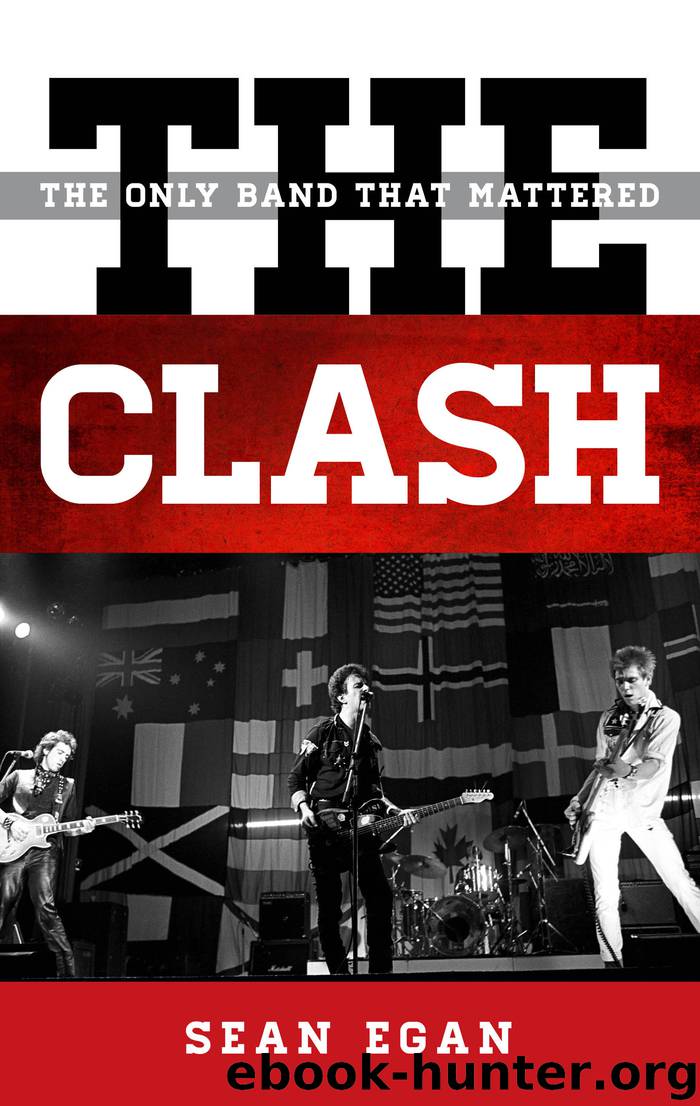The Clash by Sean Egan

Author:Sean Egan
Language: eng
Format: epub
Tags: undefined
Publisher: Rowman & Littlefield Publishers
Published: 2012-07-09T16:00:00+00:00
On July 26, 1980, The Clash secured a significant victory in their endless quest to prove that they hadn’t been corrupted by their success. As was often the case, it took the form of being seen to get one over on their record company.
The band had decided to embark on a singles campaign. Their intention was to release a 45 every month, rushing out a new one whenever the previous one started dropping out of the charts. These would obviously be new songs: the policy would hardly be remarkable—indeed, would be seen as contemptible—if based around milking albums. Their audacious plan may have been partly prompted by them being buoyed by their unprecedented chart success with the “London Calling” single, but it was no doubt also due to a penchant for yet another rock ’n’ roll myth: that the best recordings in history are to be found on 7-inch discs.
The campaign would have been one the likes of which there had never been. Even before the turn of the Seventies, when the album became more significant than the single as a means of consuming music, artists restricted themselves to one single every two to three months. Yet the strategy was not completely unreasonable: 1979 had been the best year ever for singles sales in the UK, proving that the non-album market was one record labels ignored at their peril. Not only might the strategy have worked, but with a band of The Clash’s political bent it could have also transformed the purpose of a 45: The Clash were exactly the group to make the single a state-of-the-nation address and to use it to respond to current events almost with the topicality of a newspaper.
Unfortunately, the plan fell at the first hurdle. When The Clash presented CBS with their proposed follow-up to “London Calling,” the label refused to release it. It was almost certainly because “Bankrobber” was the biggest non sequitur imaginable to the instantly arresting, uptempo “London Calling”: a mid-paced, gloomy reggae, and furthermore not a rock-reggae hybrid but the purest reggae they had yet produced. On that level, the label’s stance can be understood. The job of CBS was to make money, and this change in direction just when it appeared that The Clash were becoming as mainstream an act as a band like them could ever be must have been dismaying.
Although no doubt gutted by it, the rejection gave The Clash the type of opportunity they rarely spurned: to portray themselves as martyrs for their art and ideals. It also gave them a chance to do something that wasn’t so easily achieved: score a victory over the record company. The Clash went on strike over the non-release, refusing to do any more work on album tracks they had recently recorded in New York. However, it doesn’t seem to have been this that made CBS climb down so much as something exactly analogous to the way that Epic’s decision not to release the first Clash album had to be reversed because of the embarrassingly high level of import sales.
Download
This site does not store any files on its server. We only index and link to content provided by other sites. Please contact the content providers to delete copyright contents if any and email us, we'll remove relevant links or contents immediately.
Cecilia; Or, Memoirs of an Heiress — Volume 2 by Fanny Burney(31928)
Cecilia; Or, Memoirs of an Heiress — Volume 3 by Fanny Burney(31912)
Fanny Burney by Claire Harman(26579)
We're Going to Need More Wine by Gabrielle Union(19019)
Plagued by Fire by Paul Hendrickson(17391)
All the Missing Girls by Megan Miranda(15882)
Cat's cradle by Kurt Vonnegut(15293)
Bombshells: Glamour Girls of a Lifetime by Sullivan Steve(14036)
For the Love of Europe by Rick Steves(13792)
Leonardo da Vinci by Walter Isaacson(13282)
4 3 2 1: A Novel by Paul Auster(12352)
The remains of the day by Kazuo Ishiguro(8944)
Adultolescence by Gabbie Hanna(8900)
Note to Self by Connor Franta(7651)
Diary of a Player by Brad Paisley(7537)
Giovanni's Room by James Baldwin(7297)
What Does This Button Do? by Bruce Dickinson(6185)
Ego Is the Enemy by Ryan Holiday(5383)
Born a Crime by Trevor Noah(5353)
